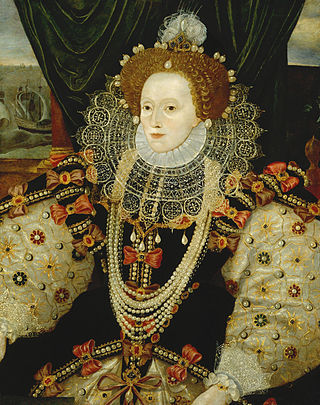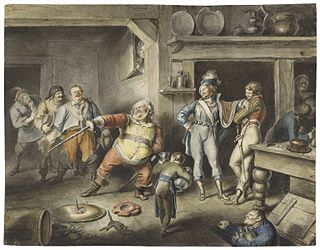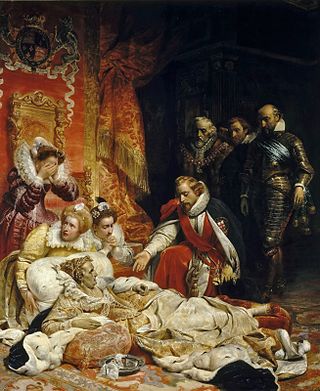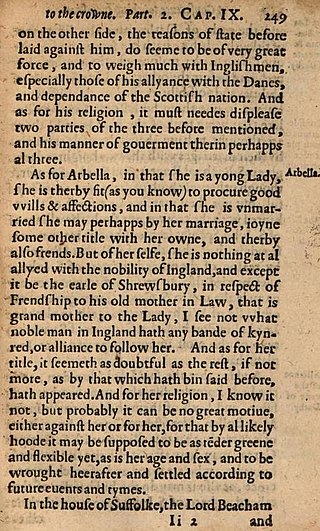
The Elizabethan era is the epoch in the Tudor period of the history of England during the reign of Queen Elizabeth I (1558–1603). Historians often depict it as the golden age in English history. The Roman symbol of Britannia was revived in 1572, and often thereafter, to mark the Elizabethan age as a renaissance that inspired national pride through classical ideals, international expansion, and naval triumph over Spain.

Stephen Jay Greenblatt is an American literary historian and author. He has served as the John Cogan University Professor of the Humanities at Harvard University since 2000. Greenblatt is the general editor of The Norton Shakespeare (2015) and the general editor and a contributor to The Norton Anthology of English Literature.

The English Renaissance was a cultural and artistic movement in England during the late 15th, 16th and early 17th centuries. It is associated with the pan-European Renaissance that is usually regarded as beginning in Italy in the late 14th century. As in most of the rest of Northern Europe, England saw little of these developments until more than a century later within the Northern Renaissance. Renaissance style and ideas were slow to penetrate England, and the Elizabethan era in the second half of the 16th century is usually regarded as the height of the English Renaissance. Many scholars see its beginnings in the early 16th century during the reign of Henry VIII. Others argue the Renaissance was already present in England in the late 15th century.

In England and Wales, the Tudor period occurred between 1485 and 1603, including the Elizabethan era during the reign of Elizabeth I (1558–1603). The Tudor period coincides with the dynasty of the House of Tudor in England, which began with the reign of Henry VII. Under the Tudor dynasty, art, architecture trade, exploration and commerce flourished. Historian John Guy (1988) argued that "England was economically healthier, more expansive, and more optimistic under the Tudors" than at any time since the Roman occupation.
David Norbrook was Merton Professor of English literature at Oxford University from 2002 to 2014, and is now an Emeritus Fellow of Merton College, Oxford. He specializes in literature, politics and historiography in the early modern period, and in early modern women's writing. He is currently writing a biography and edition of Lucy Hutchinson. He teaches in literary theory and early modern texts, in early modern women writers, and in Shakespeare, Milton and Marvell. Before his current role, he taught at the University of Maryland.
Susan Michelle Doran FRHistS is a British historian whose primary studies surround the reign of Elizabeth I, in particular the theme of marriage and succession. She has published and edited sixteen books, notably Elizabeth I and Religion, 1558-1603, Monarchy and Matrimony and Queen Elizabeth I, the last part of the British Library's Historic Lives series.

The religious views of William Shakespeare are the subject of an ongoing scholarly debate dating back more than 150 years. The general assumption about William Shakespeare's religious affiliation is that he was a conforming member of the established Church of England. However, many scholars have speculated about his personal religious beliefs, based on analysis of the historical record and of his published work, with claims that Shakespeare's family may have had Catholic sympathies and that he himself was a secret Catholic.

History is one of the three main genres in Western theatre alongside tragedy and comedy, although it originated, in its modern form, thousands of years later than the other primary genres. For this reason, it is often treated as a subset of tragedy. A play in this genre is known as a history play and is based on a historical narrative, often set in the medieval or early modern past. History emerged as a distinct genre from tragedy in Renaissance England. The best known examples of the genre are the history plays written by William Shakespeare, whose plays still serve to define the genre. History plays also appear elsewhere in British and Western literature, such as Thomas Heywood's Edward IV, Schiller's Mary Stuart or the Dutch play Gijsbrecht van Aemstel.
Professor Roy T. Eriksen was a Norwegian Renaissance scholar and Marlowe scholar teaching at the University of Agder.
Kevin M. Sharpe was a British historian, Director of the Centre for Renaissance and Early Modern Studies, Leverhulme Research Professor and Professor of Renaissance Studies at Queen Mary, University of London. He is best known for his work on the reign of Charles I of England.

The succession to the childless Elizabeth I was an open question from her accession in 1558 to her death in 1603, when the crown passed to James VI of Scotland. While the accession of James went smoothly, the succession had been the subject of much debate for decades. In some scholarly views, it was a major political factor of the entire reign, even if not so voiced. Separate aspects have acquired their own nomenclature: the "Norfolk conspiracy", Patrick Collinson's "Elizabethan exclusion crisis", and the "Secret Correspondence".

A Conference about the Next Succession was a pseudonymous book published by "Doleman", and dealing with the succession to Elizabeth I of England. The cover date is 1594, but the real publication date is taken to be around September 1595, in Amsterdam. The author has traditionally been identified with Robert Persons, an English Jesuit exile. It has also been suggested that Doleman is a collective pseudonym.
Carla Mazzio, an American literary and cultural critic, specializes in early modern literature in relationship to the history of science, medicine, and health, the history of language, media technologies, and the printed book, and the history of speech pathologies with a focus on the harmful social construction of the “inarticulate” person or community. Her research has been supported by the Guggenheim Foundation, the National Endowment for the Humanities, and the Radcliffe Institute for Advanced Study at Harvard University.
Regina Schwartz is a scholar of English literature and elements of Jewish and Christian religion. A Professor of English and Religion at Northwestern University, she has been known historically for her research and teaching on 17th-century literature, on the Hebrew Bible, and on the interface of literature with the subjects of philosophy, law, and religion.
Lorna Margaret Hutson, FBA is the ninth Merton Professor of English Literature and a fellow of Merton College, Oxford. Together with Professor John Hudson, she is a director of the Centre for Medieval and Early Modern Law and Literature at the University of St Andrews.
Annabel M. Patterson is the Sterling Professor Emeritus of English at Yale University.
Jeffrey A. Masten is an American academic specializing in Renaissance English literature and culture and the history of sexuality. He is the author and editor of numerous books and scholarly articles. Masten's book Queer Philologies was awarded the 2018 Elizabeth Dietz Prize for the best book in the field of early modern drama by the journal SEL: Studies in English Literature 1500–1900. He was named a Guggenheim Fellow in English Literature for 2022.
Nigel Smith is a literature professor and scholar of the early modern world. He is William and Annie S. Paton Foundation Professor of Ancient and Modern Literature and Professor of English at Princeton University, where he has taught since 1999. He is best known for his interdisciplinary work, bridging literature and history, on 17th-century political and religious radicalism and the literature of the English Revolution, including the poetry and prose of John Milton and Andrew Marvell.
Nandini Das is professor of Early Modern Literature and Culture in the English faculty at the University of Oxford. She is a specialist in Shakespeare studies, Renaissance romance writing, early travel literature, and encounters between different cultures.
Julia Reinhard Lupton is an American scholar of William Shakespeare and renaissance literature. She is a professor of English at the University of California, Irvine and received a Guggenheim Fellowship for her scholarship.








